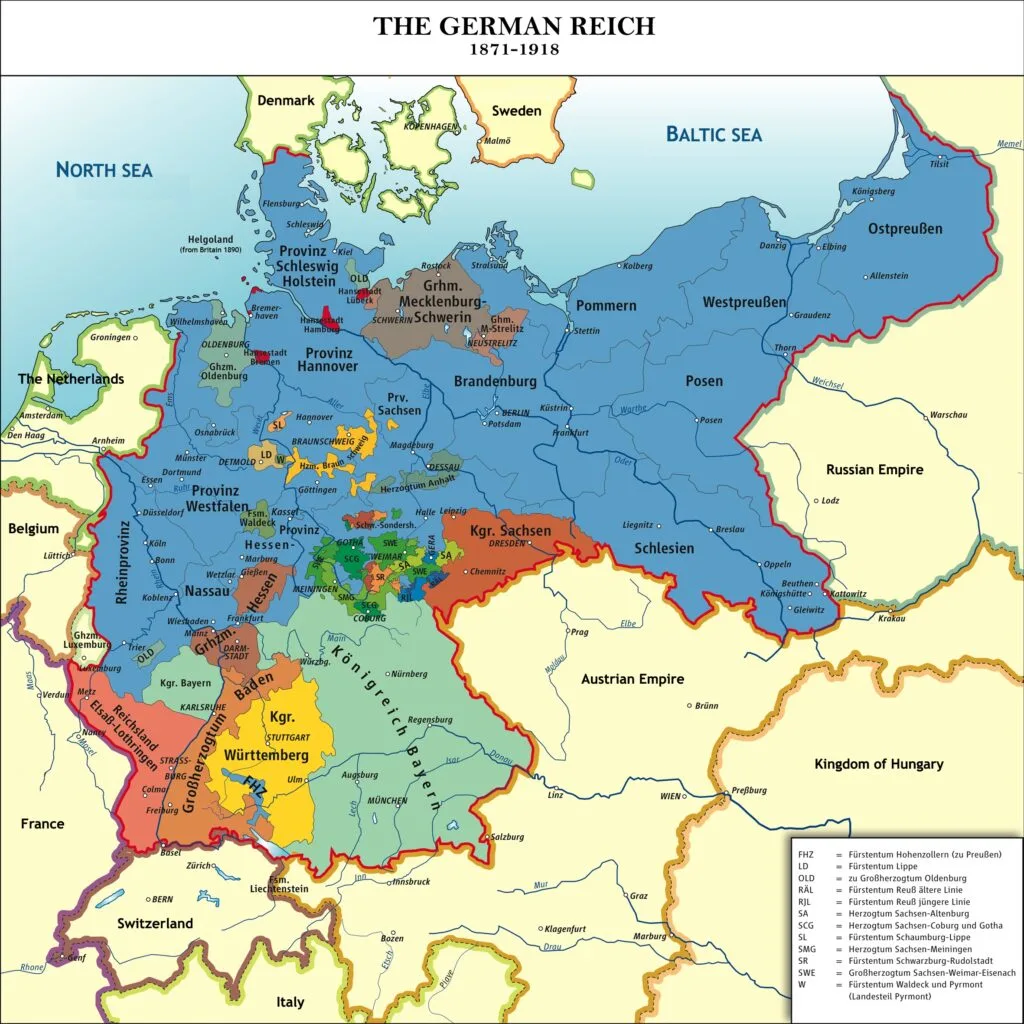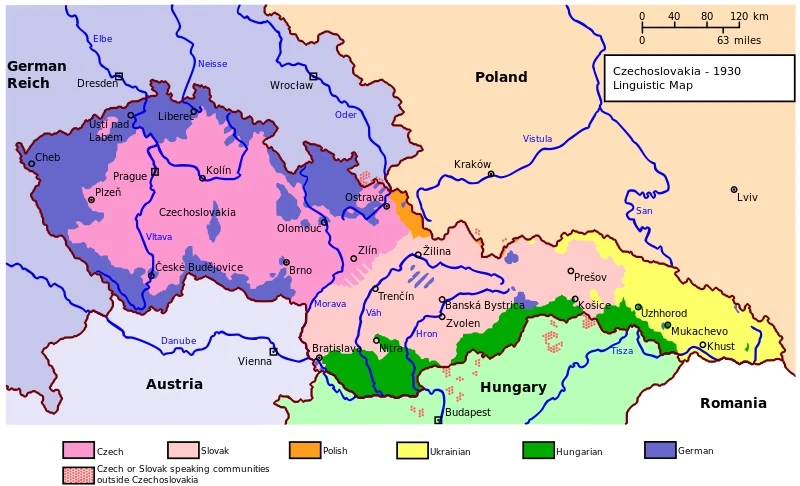Do you wonder if it is possible to research your German ancestors without actually having to go to Germany? In this post, we'll discuss how to research your German ancestors from the comfort of home.

Of course, I would love to take a trip to Germany to see where my ancestors lived and maybe do some genealogy research at the local level. That's every genealogist's dream, right?
However, travel is very expensive, and I'm not fluent in German, so I don't know how effective I would really be.
Plus, I have ancestors from multiple different regions of Germany, which means that a real family history research trip could take weeks. This would mean time in Baden-Württemberg, Bavaria, and Hesse, at the very least.
As much as I would love to do this, I can't see it happening any time soon.
Do you have to go to Germany to do German genealogy?
Fortunately, those of us with German ancestry can do a lot of German genealogy research right from our home computer or local library. It is not necessary to travel to Germany to learn about your ancestors from that country.
When I first began learning about my family tree, I didn't know anything about my German ancestors. In fact, I wasn't even sure that I had German ancestors. My first step was to learn about all of my great-grandparents by starting a family tree on Ancestry.
In short order, I learned that two of my great-grandmothers were the children of German immigrants to the United States. This was only the beginning of my quest, and my goal was to find out exactly where in Germany my German immigrant ancestors were born, as well as the names of their parents and grandparents, if possible.
While I still have a couple of mysteries in the German lines of my family tree, I've been able to make a lot of progress using only digitized records and indexes that I can access online right from my laptop. I'll tell you more about the specific sites and resources that I used further down in this article.
But the point is that you can definitely make good progress on your German research without having to take a time consuming and expensive trip. Plus, it's always better to take a family history trip after you've learned as much as you can from home about your ancestors - it makes the trip much more meaningful.
It goes without saying that if you are ever presented with the chance to go to Germany to meet family or do ancestry research, you should consider going. There is some information that can only be found by in-person visits but this should not discourage you if you are unable to go to Germany yourself.
There is so much that we can learn from where we find ourselves today!
Start your German genealogy research with your parents and grandparents
The best place to start when it comes to learning about your German ancestors is your parents, grandparents and great-grandparents, even if they were not born in Germany. You should learn as much as you can about these recent ancestors because you might make an important discovery that will help direct your future family tree research.
For example, you might discover that you have more German ancestors than previously thought. This happened to me when I learned through genealogy records on Ancestry that my Dutch-American grandfather was actually Dutch and German-American.
Prior to this discovery, I had no idea that I had German roots on my dad's side of the family and had only been researching German ancestors on my mother's side.
Learning about your grandparents and great-grandparents will also help you pinpoint exactly where in Germany, or a neighboring country, you should look for documents and and other records pertaining to your family members.
Genealogical records in Germany are generally held at the local level, even if they have been compiled and digitized for online viewing - there is no national repository for vital records in Germany. If we know where the records are held, it can help us decide where to look online for possible records.
Where can you find German records for genealogy and family history
There are many resources for finding German genealogy records accessible to those of us who are not in Germany, and many of them are available online. In addition, a great number of these resources are available for free.
Below are only a few of sites where I have been able to find records about my ancestors and other relatives. I will add additional resources over time.
Ancestry.com
Ancestry.com is great for building a family tree and finding plenty of records in the United States and Europe, among other countries, as well as searching public member trees. Building a family tree is free, but most records do require a subscription.
Familysearch.org
Familysearch.org is another good resource for building a family tree and finding records, both of which you can do for free on the site. Many records that show up in search are available as digital images, but some may require you to visit the family history research library or research center in order to view.
Szukaj w Archiwach
Szukaj w Archiwach is an online database run by the Polish government where you can find information about your ancestors who lived in the now-Polish parts of what was once part of the German Empire.
Trauer.de
This is a good resource for finding German-language obituaries printed in German newspapers.
MyHeritage
MyHeritage, a paid service, offers access to a variety of genealogy database, as well as DNA testing and the ability to build a family tree. One important database of note is the index of displaced Jewish persons available on MyHeritage.
Gedbas
Gedbas is helpful site with compiled genealogies, where you might be able to find your German ancestors.
How to know if your German ancestors were from Germany
If you have gotten stuck while researching your German ancestors, you should definitely check to make sure that you are searching in the right place for records. Some Germans in our family trees may not have lived in what we now know as Germany.
The modern day borders of the Federal Republic of Germany did not exist as we know them today until 1990, when West and East Germany were reunified. Prior to this, another important modern change in Germany's occurred after World War II with the division of of the Prussian region
Even if you know that you have German ancestors, it is important to start your German genealogy research with your most recent ancestors. Because of shifting political borders in Europe, you could find that your German-speaking ancestors were born in what is now Poland, Austria, or even the Czech Republic (formerly Czechoslovakia).
The map below shows the territory of the German Empire until 1918. For reference, you might note that the empire extended as far east as what is now Russia's border with Lithuania, covering much of modern Poland.

While the German Empire did not extend into what is now the Czech Republic, we know that there were ethnic Germans and German-speaking communities throughout the region. The image below is a linguistic map of the Czech Republic in 1930, and you will note that in the Czech region of Czechoslovakia, German is the most common language spoken in almost every border region, especially the border shared with the Germany.

Understanding where your German-speaking or ethnic German ancestors were born can help you discover where you should look for genealogy records pertaining to their lives. This was one of the most helpful bits of information for my own search for German ancestors.
As it turns out, the reason that I could not find records within Germany for one line of my German family tree is because they were not actually from Germany. They were German-speaking residents of Poznań, which is located in modern-day Poland.
How to find lost relatives German relatives
If you have relatively recent ancestors who were from Germany, the German Empire, or from an ethnic-German community in another European country, you probably have cousins who still live in or near those locations. Some of these cousins might not be so distantly related to you.
For example, if your great-grandfather came to the United States and his siblings stayed behind, you could have European cousins who are descended from your great-great grandparents. These individuals could be second-cousins once-removed or third cousins.
If your great-great grandparent was the immigrant, but some of their siblings stayed behind, you likely have 3rd-4th cousins living in Europe.
The fastest way to potentially find these cousins is to take a DNA test. For finding European cousins, I recommend doing a DNA test with MyHeritage because they have a substantial database of international DNA customers, and some of these people will show up as DNA matches for you.
You might also have some luck researching the town where you ancestors were born and looking for people who still live there with the same surname. Social media is a good place to do this research, but your results will vary, and you might encounter a substantial language barrier.
Plus, not everyone is as interested in family history as we are!
Another option is to find your ancestor located in someone else's family tree, understanding that there would be a possibility that you might be related. The best way to find other family trees with your ancestors family members in them is to search on Ancestry or Family Search.
Alternatively, you could create an account on Stammbaum-Online (Stammbaum means "family tree" in German) and add the surnames and locations that you are researching to see if someone eventually contacts you about your search. You could potentially find a distant relative this way.
Is there a limit to what you can learn online?
You won't be able to learn everything about your German ancestors and living relatives online. For example, there may be archives held at local parish offices or church archives.
There are also many locations, such as cemeteries, where we could learn more about our ancestors if we were able to visit.
However, most people will not find it practical to visit Germany or other countries for genealogy research, for the reasons that I mentioned at the beginning of this article. There is so much that we can learn on our phones or computers, and it is generally enough to satisfy the most curious family history researcher.
The internet has truly been a game-changer for genealogy over the past few decades.
Conclusion
I hope that you have enjoyed this overview of how you can go about researching your German roots without having to leave your state or province. Of course, we can all still dream about traveling to Germany once we know exactly how we could use such a trip to further our research.
If you have any questions about something that you read in this post, or if you would like to share a resource that you have enjoyed for learning about your German ancestors, please feel free to join in the discussion below.
Thanks for reading today.

gary
Sunday 9th of March 2025
I have found German Catholic ancestors' birth marriage death records going back to the 1600's free on Matricula. FamilySearch has permission to marry documents which are awesome.